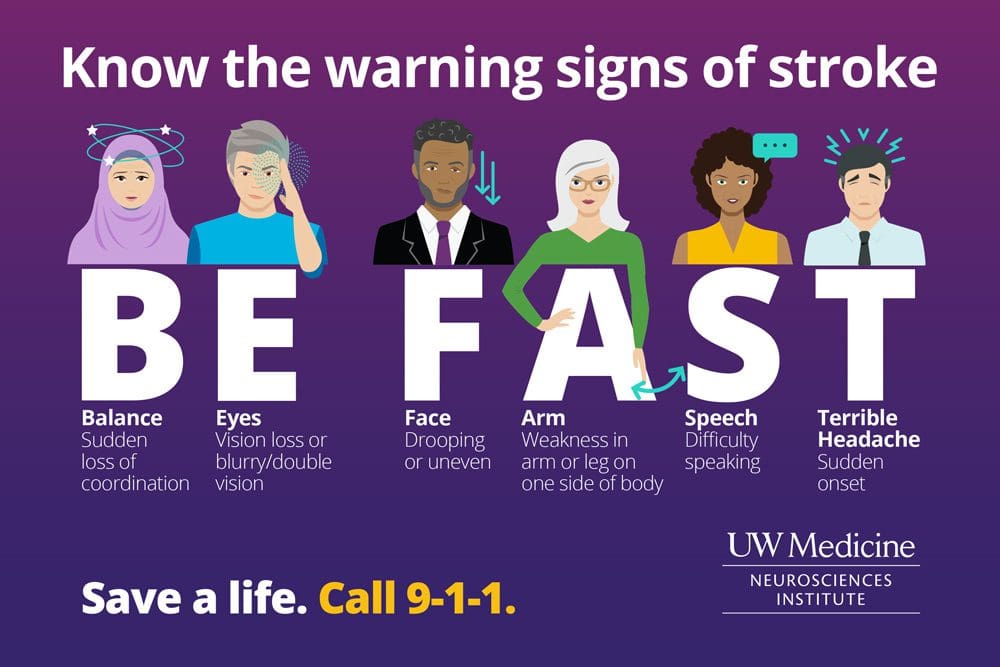Highlights | Join the movement
- The 2022 Puget Sound Heart and Stroke Walk will be on Saturday, Oct. 8, at the Seattle Center.
- Understanding the signs and symptoms of heart disease is essential for people from all walks of life.
- You can register for this year’s walk or join a UW Medicine team.
The Puget Sound Heart and Stroke Walk is returning this October, in time to celebrate Heart and Stroke Walk Day on Oct. 8. The walk encourages overall health and well-being through spotlighting a physically active lifestyle, advocating for research funding and education on heart and brain health, and more.
”Heart attacks and strokes touch nearly everyone in their lives, and UW Medicine has dedicated huge resources to providing outstanding care through the full-time course of such conditions,” says David Tirschwell, MD, the medical director of Comprehensive Stroke Care at the UW Medicine Stroke Center at Harborview. “The walk shines a light on these important health topics and supports efforts of the American Heart Association (AHA) and American Stroke Association (ASA) to educate the community, advocate for favorable public policy and fund research to better the care and outcomes for these patients.”
What to know about strokes
Strokes, also called “brain attacks,” occur when blood flow to your brain stops. This could happen when a blood vessel is blocked by a clot or if the vessel ruptures, preventing the brain from getting the blood and oxygen it needs. This eventually leads to the death of brain cells, causing further complications.
B.E. F.A.S.T. when identifying a stroke
Getting help quickly is crucial for having better outcomes after a stroke. If you feel like you or someone around you may be having a stroke, look for signs using this acronym and call 911 immediately:

Visual resources are also available to help you remember these steps in case you forget.
It’s important to let someone else drive you or call 911 for an ambulance if you’re experiencing the symptoms of a stroke.
What to know about heart health
While we typically think of the brain when thinking of stroke, the body’s organs work closely together, so it’s important to remember to prioritize heart health to help prevent stroke.
“The brain and the heart are deeply connected, and most of the behaviors and conditions to treat to minimize the risk of heart or brain ill health, will actually help prevent both,” says Tirschwell.
“I think people don’t realize that [heart disease] is still the number one killer in the U.S.,” says Ruchi Kapoor, MD, a cardiologist at the Heart Institute at Eastside Specialty Center. “Millions of people are affected by heart attacks, stroke, heart failure and valve disease, and about 70% of that is avoidable depending on risk factors and lifestyle.”
The American Heart Association revealed that only 20% of participants in a study of more than 23,000 adults and children in the U.S. have optimal heart health.
Kapoor explains the eight critical factors for a healthy heart:
- Exercise: Aim for 150 minutes of moderate-intensity exercise each week.
- Diet: Incorporate healthy foods, fruits, vegetables and multi-grain and whole grain bread and rice.
- Sleep: The average adult needs 7-8 hours of sleep each night.
- Nicotine exposure: Second-hand exposure also carries heart health risks, so take a comprehensive look at your nicotine exposure and ensure you’re minimizing it.
- Blood pressure: Your goal blood pressure should be under 130/80. If you smoke, talk with your doctor about how to stop.
- Cholesterol: High-density lipoprotein (HDL) is the good cholesterol that we want to be as high as possible, but high low-density lipoprotien (LDL) numbers are associated with heart disease and should be watched.
- Blood sugar: We love sugar, but it’s not great for us in excessive quantities (but OK in little treats).
- Weight: Focusing on the first four factors of exercise and diet will also translate into a healthier weight.
How to participate in the walk
You can participate in Heart and Stroke Walk day by joining one of the UW Medicine teams, by sharing information on heart and stroke health or by taking small steps towards caring for your own stroke or heart health. As the Puget Sound Heart Walk committee says – no matter where you choose to walk, participating and donating to the Puget Sound Heart and Stroke Walk will save lives and improve lives.
Learn more about how to join UW Medicine at this year’s walk.
Barbara Clements, UW Medicine Newsroom, contributed to this article.


